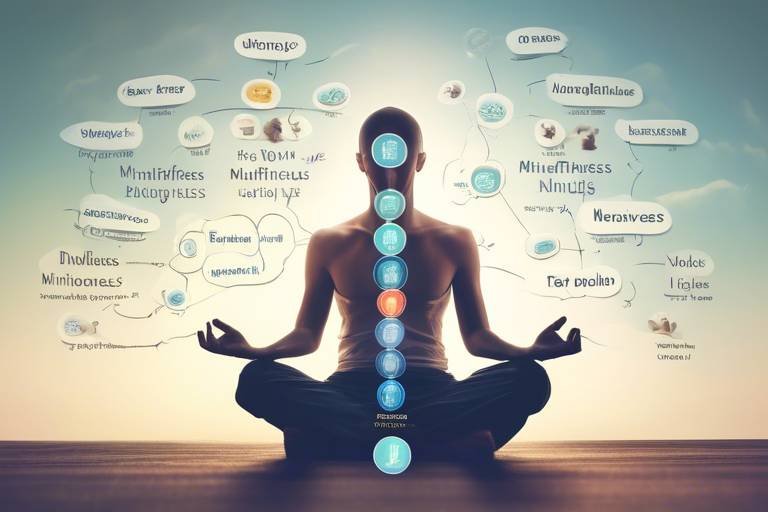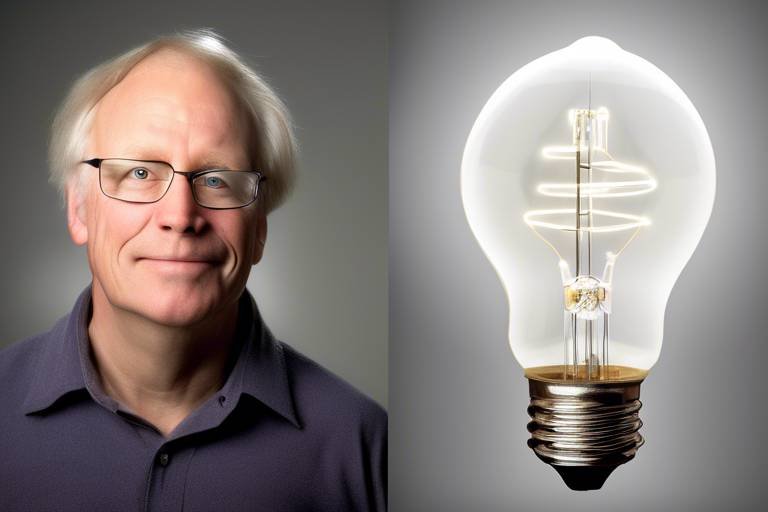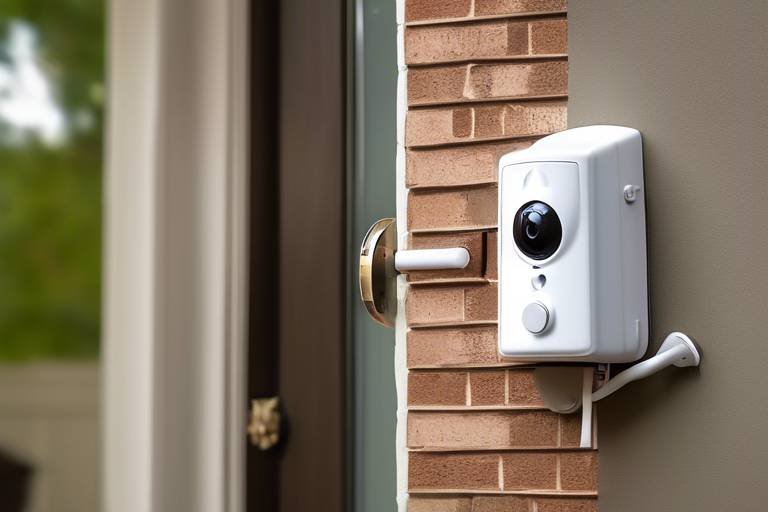The Science of Mindfulness - How It Affects Our Daily Life
Mindfulness is more than just a buzzword; it's a transformative practice that can significantly alter our daily experiences. In a world buzzing with distractions, the ability to focus on the present moment is a priceless skill. Imagine sitting in a crowded café, the aroma of coffee enveloping you, yet your mind is racing with thoughts of the past and future. Mindfulness teaches us to savor that moment, to appreciate the sounds, smells, and sensations around us. It’s like a mental reset button that brings clarity and peace.
Mindfulness is rooted in ancient traditions, particularly Buddhism, but it has gained immense popularity in modern psychology as a practical tool for enhancing well-being. At its core, mindfulness is about being fully present and engaged in the here and now. Unlike other forms of meditation that may require you to clear your mind completely, mindfulness encourages you to acknowledge your thoughts and feelings without judgment. This simple shift in perspective can be incredibly powerful, akin to switching from a blurry to a sharp image on a camera.
Research has shown that practicing mindfulness can lead to significant improvements in mental health. It acts as a shield against the daily stresses of life, reducing symptoms of anxiety and depression. When we practice mindfulness, we train our brains to respond to challenges with a sense of calm and clarity. This can be especially beneficial in high-pressure situations, where a moment of mindfulness can mean the difference between reacting impulsively and responding thoughtfully.
But how does mindfulness actually change our brains? Studies reveal that regular mindfulness practice can lead to structural changes in the brain. For instance, areas associated with emotional regulation and self-awareness, such as the prefrontal cortex and amygdala, show increased activity and connectivity. This means that not only are we better equipped to manage our emotions, but we also become more adept at understanding ourselves and our reactions.
Specifically, mindfulness has a profound impact on several key brain regions:
- Prefrontal Cortex: Enhances decision-making and self-control.
- Hippocampus: Boosts memory and learning capabilities.
- Amygdala: Reduces the brain's fear response, leading to lower anxiety levels.
These changes facilitate better mental health outcomes, allowing individuals to navigate life's ups and downs with greater resilience.
Long-term practice of mindfulness can lead to lasting changes in brain structure. This has profound implications for aging and cognitive decline. For example, studies suggest that individuals who engage in mindfulness practices regularly may experience slower rates of cognitive decline as they age. It's like giving your brain a workout, keeping it sharp and agile well into your later years.
Incorporating mindfulness into your daily routine can transform even the most mundane tasks into moments of joy and awareness. Whether you're washing the dishes or taking a walk, being fully present can enhance your experience. Here are some practical tips:
- Start Small: Begin with just a few minutes of mindfulness each day.
- Use Reminders: Set reminders on your phone to pause and breathe.
- Mindful Eating: Focus on the flavors and textures of your food during meals.
By weaving mindfulness into the fabric of your daily life, you can cultivate a greater sense of peace and fulfillment.
Mindfulness doesn’t just benefit our mental well-being; it also has a profound impact on our physical health. Studies have shown that mindfulness practices can lead to better physical health outcomes, such as improved immune function and effective pain management. Think of mindfulness as a bridge connecting your mind and body, allowing for a harmonious balance that promotes overall wellness.
One of the most well-known programs that utilize mindfulness techniques is Mindfulness-Based Stress Reduction (MBSR). This structured program includes various components, such as:
- Mindful meditation
- Body awareness exercises
- Yoga practices
MBSR has been shown to be effective in reducing stress, anxiety, and chronic pain, making it a valuable tool in healthcare practices.
Adopting mindfulness can inspire significant lifestyle changes. It encourages healthier habits, such as improved nutrition, regular exercise, and better sleep hygiene. When we’re more aware of our choices, we’re more likely to make decisions that align with our health goals. It’s like turning on a light in a dark room; suddenly, everything is clearer, and you can see the path ahead.
Q: Can anyone practice mindfulness?
A: Absolutely! Mindfulness is accessible to everyone, regardless of age or background. It’s about finding what works for you.
Q: How long does it take to see benefits from mindfulness?
A: Many people experience benefits within a few weeks of regular practice, but the key is consistency.
Q: Do I need to meditate for long periods to be effective?
A: No, even a few minutes of mindfulness each day can lead to significant improvements.
In conclusion, mindfulness is a powerful tool that can enhance our mental and physical well-being. By embracing the present moment, we can truly transform our daily lives.

Understanding Mindfulness
Mindfulness is more than just a buzzword; it’s a transformative practice that invites us to fully engage with the present moment. Imagine standing on a beach, feeling the warm sand between your toes, listening to the rhythmic waves crashing against the shore, and letting the salty breeze envelop you. That’s mindfulness in action—a state of being where your thoughts, feelings, and sensations are acknowledged without judgment. Originating from ancient Buddhist traditions, mindfulness has evolved into a secular practice embraced by many cultures worldwide. But what exactly does it mean to be mindful?
At its core, mindfulness is about awareness. It’s the art of paying attention to our thoughts, emotions, and surroundings in a deliberate way. Unlike other forms of meditation that might focus on achieving a certain state of mind or transcendental experience, mindfulness emphasizes the importance of the here and now. It’s like tuning into your favorite radio station; when you adjust the dial just right, everything comes into clear focus. This clarity can be incredibly refreshing in our fast-paced, often chaotic lives.
So, how does mindfulness differ from other forms of meditation? While traditional meditation often involves techniques such as visualization or mantra repetition, mindfulness encourages us to observe our thoughts and feelings as they arise. It’s a practice rooted in acceptance—accepting what we feel without trying to change it. This doesn’t mean we condone negative feelings; rather, we acknowledge their presence and allow them to pass without getting caught up in a mental tug-of-war. Think of it as watching clouds drift across the sky; they come and go, but you remain grounded.
The benefits of mindfulness are profound and far-reaching. Studies have shown that practicing mindfulness can lead to improved emotional regulation, reduced anxiety, and enhanced overall well-being. But the beauty of mindfulness lies not just in its benefits; it’s in the journey itself. As we cultivate mindfulness, we learn to navigate life’s ups and downs with greater ease. It’s like learning to ride a bike—at first, it may feel wobbly and uncertain, but with practice, we gain balance and confidence.
To truly grasp the concept of mindfulness, it’s essential to understand its foundational elements. Here’s a brief overview:
- Awareness: Being fully present in the moment.
- Non-judgment: Observing thoughts and feelings without labeling them as good or bad.
- Acceptance: Acknowledging experiences as they are, without trying to change them.
By integrating these elements into our daily lives, we can transform mundane moments into meaningful experiences. Whether it’s savoring a meal without distractions or taking a few deep breaths before a meeting, mindfulness invites us to live with intention. It’s about reclaiming our time and attention in a world that often demands our focus elsewhere.
In conclusion, understanding mindfulness is the first step towards incorporating it into our lives. It’s not just a practice; it’s a way of being that encourages us to embrace the present moment. As we embark on this journey, we open ourselves to a world filled with possibilities, where each moment is an opportunity for growth and connection.

The Psychological Benefits of Mindfulness
Mindfulness is not just a buzzword; it's a powerful practice that can transform our mental landscape. Imagine standing in the middle of a bustling city, surrounded by noise and chaos, yet feeling an overwhelming sense of calm. That’s the essence of mindfulness. Research has shown that practicing mindfulness can significantly reduce symptoms of anxiety, depression, and stress, leading to improved emotional well-being. It acts like a mental reset button, allowing individuals to step back from their thoughts and feelings, observe them without judgment, and create a space between stimulus and response.
One of the most compelling aspects of mindfulness is its ability to enhance our emotional regulation. When we practice mindfulness, we train our brains to respond to stressors in a healthier way. Instead of reacting impulsively to challenges, we can pause, reflect, and choose a more constructive response. This shift can be likened to upgrading your mental software; you’re not just reacting to life’s events but engaging with them in a more thoughtful manner.
Studies have shown that mindfulness practices can lead to significant reductions in anxiety levels. For instance, a meta-analysis of various research studies indicated that mindfulness-based interventions can decrease anxiety symptoms by up to 30%. This is particularly beneficial for individuals who struggle with chronic anxiety, as mindfulness allows them to break the cycle of worry and fear. Here’s a quick overview of how mindfulness impacts various psychological aspects:
| Psychological Aspect | Impact of Mindfulness |
|---|---|
| Anxiety | Reduces symptoms by promoting relaxation and awareness |
| Depression | Decreases depressive symptoms through emotional regulation |
| Stress | Helps manage stress levels by fostering a sense of calm |
| Emotional Regulation | Enhances ability to respond to emotions constructively |
Moreover, mindfulness fosters a greater sense of self-awareness. By tuning into our thoughts and feelings, we become more attuned to our emotional states, allowing us to recognize patterns that may lead to negative outcomes. This self-awareness serves as a powerful tool for personal growth. It’s like having a personal coach in your mind, guiding you to make better choices and avoid pitfalls.
Another fascinating benefit of mindfulness is its impact on overall life satisfaction. People who engage in mindfulness practices often report higher levels of happiness and contentment. This is largely due to the practice encouraging gratitude and appreciation for the present moment. Instead of getting caught up in what we lack, mindfulness helps us focus on what we have, fostering a more positive outlook on life.
Incorporating mindfulness into daily routines doesn’t have to be complicated. Simple practices like mindful breathing, body scans, or even mindful eating can be seamlessly integrated into our lives. For example, when eating, taking the time to savor each bite can transform a mundane meal into a delightful experience. This not only enhances enjoyment but also promotes healthier eating habits, as we become more in tune with our hunger and fullness cues.
So, how can you start reaping these psychological benefits of mindfulness? Here are a few tips:
- Start small: Dedicate just a few minutes each day to mindfulness practice.
- Find a quiet space: Create a calming environment where you can focus.
- Use guided meditations: These can help you stay on track and deepen your practice.
- Be patient: Like any skill, mindfulness takes time to develop.
In conclusion, the psychological benefits of mindfulness are profound and far-reaching. From reducing anxiety and depression to enhancing emotional regulation and self-awareness, mindfulness is a valuable tool for improving mental health and overall well-being. As you embark on your mindfulness journey, remember that every small step counts. Embrace the process, and watch as your life transforms in ways you never thought possible.

Neuroscience Behind Mindfulness
The fascinating world of neuroscience reveals that mindfulness is not just a trendy buzzword; it’s a powerful practice that can significantly alter the brain’s structure and function. When we engage in mindfulness, we’re not merely zoning out or daydreaming; instead, we are actively reshaping our neural pathways. This process is akin to sculpting clay—each moment of focused attention helps to mold our brains into healthier, more resilient forms.
Research has shown that mindfulness can lead to increased gray matter density in regions of the brain associated with emotional regulation, self-awareness, and empathy. For instance, studies conducted using MRI scans have demonstrated that regular mindfulness practitioners often exhibit heightened activity in the prefrontal cortex, the area responsible for decision-making and moderating social behavior. This is like giving your brain a workout, strengthening its ability to handle stress and make thoughtful choices.
Moreover, mindfulness appears to decrease the size of the amygdala, the brain’s fear center. With a smaller amygdala, individuals may experience reduced anxiety and fear responses. Imagine your brain as a bustling city; the amygdala is like a fire alarm that goes off at the slightest hint of smoke. By practicing mindfulness, you are essentially learning how to manage that alarm, preventing it from blaring unnecessarily.
But what exactly happens in the brain during mindfulness practice? Here’s a brief overview of some key processes:
- Increased Connectivity: Mindfulness enhances connectivity between different brain regions, particularly those involved in emotional regulation and cognitive control.
- Enhanced Neuroplasticity: Regular mindfulness practice promotes neuroplasticity, allowing the brain to adapt and reorganize itself throughout life.
- Decreased Stress Response: Mindfulness can help lower cortisol levels, the hormone associated with stress, leading to a calmer state of mind.
These changes are not merely temporary; they have lasting implications for how we interact with the world and ourselves. The long-term practice of mindfulness can lead to significant improvements in cognitive abilities, such as attention span and memory retention. It’s like upgrading your brain’s operating system—suddenly, tasks that once felt overwhelming become manageable, and your ability to focus sharpens.
Furthermore, the implications of these neural changes extend beyond just mental health. They can play a crucial role in emotional regulation, helping individuals respond to challenges with a sense of calm rather than panic. This is particularly beneficial in high-stress environments, where quick thinking and emotional stability are essential. Think of mindfulness as a mental buffer, allowing you to navigate life’s challenges with grace and poise.
In summary, the neuroscience behind mindfulness showcases its profound impact on the brain. By altering brain structure and function, mindfulness not only enhances our mental capabilities but also fosters emotional resilience. It’s a powerful reminder that our minds are not fixed; they are dynamic and capable of growth, much like a garden that flourishes with care and attention.

Impact on Brain Regions
When we talk about mindfulness, we often think of it as a simple practice of staying present. However, the effects of mindfulness go much deeper, reaching into the very fabric of our brain structure and function. Research has shown that regular mindfulness practice can lead to significant changes in various brain regions, which in turn can enhance our overall mental health and emotional well-being.
One of the most notable impacts of mindfulness is on the prefrontal cortex, the area of the brain responsible for higher-order functions such as decision-making, attention, and self-regulation. Studies have revealed that mindfulness can increase the thickness of this region, leading to improved cognitive abilities. Imagine your brain as a busy office; the prefrontal cortex is like the manager ensuring everything runs smoothly. By practicing mindfulness, you’re essentially giving your manager the tools to be more effective!
Another critical area affected by mindfulness is the amygdala, which plays a key role in processing emotions, particularly fear and stress. Mindfulness practice has been shown to reduce the amygdala's reactivity, making it less likely to trigger stress responses. This is crucial in our fast-paced world where stress is a common enemy. Think of the amygdala as a smoke detector; if it’s too sensitive, it goes off at every little thing. Mindfulness helps to recalibrate that sensitivity, allowing you to respond to stressors more calmly and effectively.
Furthermore, mindfulness influences the hippocampus, an area vital for memory and learning. Research indicates that regular mindfulness practice can lead to an increase in the volume of the hippocampus, enhancing our ability to learn and retain information. This is particularly beneficial as we age, as the hippocampus tends to shrink over time. By nurturing this brain region with mindfulness, we can help maintain our cognitive abilities and memory function.
In summary, the impact of mindfulness on brain regions is profound and multifaceted. Here’s a quick overview of the key areas affected:
| Brain Region | Impact of Mindfulness |
|---|---|
| Prefrontal Cortex | Increased thickness, improved decision-making, and self-regulation. |
| Amygdala | Reduced reactivity, lower stress response. |
| Hippocampus | Increased volume, enhanced memory and learning abilities. |
These changes in brain structure not only enhance cognitive abilities but also promote better emotional regulation, leading to a more balanced and fulfilling life. As we continue to explore the depths of mindfulness, it becomes increasingly clear that this practice is not just about quieting the mind; it’s about reshaping our very brains for the better!
- What is mindfulness? Mindfulness is the practice of being fully present and engaged in the current moment, without judgment.
- How does mindfulness affect the brain? Mindfulness positively impacts areas such as the prefrontal cortex, amygdala, and hippocampus, leading to improved cognitive functions and emotional regulation.
- Can mindfulness help with stress? Yes, by reducing the reactivity of the amygdala, mindfulness can help lower stress responses.
- How can I incorporate mindfulness into my daily life? You can practice mindfulness through meditation, mindful breathing, or simply by being present during daily activities.

Long-term Effects on the Brain
The long-term practice of mindfulness has profound implications for our brain structure and functioning. Imagine your brain as a garden; the more you nurture it, the more it flourishes. Over time, consistent mindfulness practice can lead to significant changes in the brain's anatomy. Research indicates that engaging in mindfulness exercises can increase the thickness of the prefrontal cortex, the area responsible for higher-order functions such as decision-making, attention, and self-regulation. This thickening is akin to strengthening the roots of a plant, providing stability and resilience against stressors.
Furthermore, mindfulness has been shown to enhance the volume of the hippocampus, which plays a crucial role in memory and learning. Think of the hippocampus as the library of your brain; the more you read (or practice mindfulness), the more shelves you can fill with knowledge and experiences. This increase in volume can lead to improved memory retention and cognitive flexibility, allowing for better adaptation to new situations.
But what does this mean for aging? As we grow older, our brains naturally undergo a process of atrophy, leading to cognitive decline. However, studies suggest that mindfulness can act as a protective factor against this decline. By promoting neuroplasticity—the brain's ability to reorganize itself by forming new neural connections—mindfulness can help maintain cognitive function well into later years. It's like having a personal trainer for your brain, keeping it fit and agile, ready to tackle the challenges of daily life.
Moreover, the long-term effects of mindfulness extend beyond structural changes. They also influence how we respond to stress. Regular mindfulness practice can help regulate the amygdala, the brain's emotional center, which is often hyperactive in individuals experiencing chronic stress. By calming this area, mindfulness fosters a more balanced emotional state, allowing individuals to approach life's challenges with a clearer mind and a steadier heart.
In summary, the long-term effects of mindfulness on the brain are not just about physical changes; they encompass a holistic improvement in mental and emotional well-being. As we cultivate mindfulness, we are essentially investing in our brain's future, enhancing its resilience, adaptability, and overall health. So, why not start this transformative journey today? Your brain—and your future self—will thank you.
- What is mindfulness? Mindfulness is the practice of being fully present and engaged in the moment, without judgment.
- How does mindfulness affect the brain? Mindfulness can lead to structural changes in the brain, enhancing areas responsible for memory, decision-making, and emotional regulation.
- Can mindfulness help with stress management? Yes, mindfulness has been shown to reduce stress by regulating emotional responses and promoting a sense of calm.
- How can I start practicing mindfulness? You can begin with simple techniques such as focused breathing, mindful walking, or meditation.

Mindfulness in Daily Life
In today's fast-paced world, the concept of mindfulness often feels like a distant dream. However, incorporating mindfulness into our daily lives is not only possible but can also be incredibly transformative. Imagine waking up each morning and savoring your coffee, truly tasting every sip rather than gulping it down while scrolling through your phone. That’s the essence of mindfulness—being present in each moment.
But how can we weave mindfulness into the fabric of our everyday routines? It starts with small, intentional practices. For instance, when you find yourself in a conversation, instead of letting your mind wander, focus on the person speaking. Notice their facial expressions, the tone of their voice, and the emotions behind their words. This simple act can deepen your connections and enhance your relationships.
Mindfulness can also be applied to mundane tasks. Think about washing the dishes. Instead of rushing through it while mentally planning your next task, try to immerse yourself in the experience. Feel the warmth of the water, the texture of the soap, and the rhythm of your movements. This not only makes the task more enjoyable but also grounds you in the present moment.
To help you get started, here are some practical tips for integrating mindfulness into your daily life:
- Start with your breath: Take a few moments each day to focus on your breathing. Inhale deeply through your nose, hold for a moment, and exhale slowly through your mouth. This simple practice can center you and bring awareness to your body.
- Practice gratitude: Each night, jot down three things you are grateful for. This shifts your focus from what’s lacking in your life to appreciating the present moment.
- Mindful walking: Whether you’re on your way to work or taking a stroll in the park, pay attention to the sensations in your feet as they touch the ground. Notice the sights, sounds, and smells around you.
Moreover, mindfulness isn’t just a solo endeavor. You can involve friends or family in your journey. Consider organizing a mindfulness dinner where everyone shares their experiences of being present during the meal. This not only fosters a sense of community but also reinforces the practice of mindfulness in a supportive environment.
Lastly, remember that mindfulness is a journey, not a destination. Some days will be easier than others, and that’s perfectly okay. The key is to approach each moment with curiosity and kindness towards yourself. As you gradually incorporate mindfulness into your daily life, you may find that it enhances not just your mental well-being but also your overall quality of life.
Q1: What is mindfulness?
A1: Mindfulness is the practice of being fully present and engaged in the moment, aware of your thoughts and feelings without judgment.
Q2: How can I practice mindfulness daily?
A2: You can practice mindfulness daily by focusing on your breath, being present during conversations, and engaging fully in everyday tasks.
Q3: Can mindfulness help with stress?
A3: Yes, mindfulness has been shown to reduce stress levels by promoting relaxation and helping individuals manage their reactions to stressors.
Q4: Do I need to meditate to be mindful?
A4: While meditation is a common way to cultivate mindfulness, it's not the only method. Mindfulness can be practiced through various activities, such as mindful eating or walking.
Q5: How long does it take to see the benefits of mindfulness?
A5: Benefits can vary, but many people report feeling more relaxed and centered within a few weeks of consistent practice.

Mindfulness and Physical Health
When we think about mindfulness, we often picture serene moments of meditation or quiet reflection. However, the benefits of mindfulness extend far beyond just our mental well-being. In fact, research shows that being present in the moment can have profound effects on our physical health as well. Imagine your body as a finely tuned instrument; when you practice mindfulness, you're essentially tuning that instrument for optimal performance.
One of the most significant ways mindfulness impacts physical health is through its ability to reduce stress. When we experience stress, our bodies release cortisol, a hormone that can wreak havoc on our health if levels remain elevated over time. Chronic stress is linked to various health issues, including heart disease, obesity, and weakened immune function. By practicing mindfulness, we can effectively lower our stress levels, leading to a cascade of positive health outcomes. It's like hitting the reset button on your body, allowing it to function as it should.
Moreover, mindfulness has been shown to improve pain management. Many individuals dealing with chronic pain conditions report that mindfulness practices help them cope better with their pain. Instead of being consumed by discomfort, mindfulness encourages a shift in focus, allowing individuals to observe their pain without judgment. This can lead to a greater sense of control and less emotional suffering associated with physical ailments.
In a study conducted by researchers at the University of Massachusetts, participants who engaged in mindfulness practices reported a significant decrease in their perception of pain. They learned to view pain as a passing sensation rather than a permanent state. This transformation in perspective can be a game-changer for those struggling with ongoing pain issues.
Another area where mindfulness shines is in improving immune function. A study published in the journal Psychosomatic Medicine found that individuals who participated in mindfulness-based stress reduction programs had significantly higher levels of antibodies in response to a flu vaccine compared to those who did not practice mindfulness. This suggests that mindfulness can enhance our body's ability to fight off infections and diseases, serving as a natural boost to our immune system.
To further illustrate the connection between mindfulness and physical health, consider the following table:
| Benefit | Description |
|---|---|
| Stress Reduction | Lowers cortisol levels, reducing the risk of stress-related diseases. |
| Pain Management | Helps individuals cope with chronic pain by shifting focus and perception. |
| Improved Immune Function | Enhances the body's response to infections and diseases. |
Incorporating mindfulness into our daily routines can also lead to healthier lifestyle choices. When we become more aware of our bodies and how they feel, we are more likely to make decisions that promote our physical health. For example, mindfulness can encourage better nutrition, as we become more attuned to our hunger cues and the effects of food on our bodies. It can also inspire us to engage in regular physical activity, as we learn to appreciate the movement of our bodies rather than viewing exercise as a chore.
In conclusion, mindfulness is not just a mental exercise; it's a holistic approach that can significantly enhance our physical health. By reducing stress, improving pain management, and boosting our immune system, mindfulness serves as a powerful tool in our journey toward overall well-being. So, the next time you find yourself caught up in the chaos of life, remember that taking a moment to practice mindfulness can lead to a healthier, happier you.
- What is mindfulness? Mindfulness is the practice of being present and fully engaged in the current moment, without judgment.
- How does mindfulness improve physical health? Mindfulness reduces stress, enhances pain management, and boosts immune function, contributing to overall physical well-being.
- Can anyone practice mindfulness? Yes! Mindfulness is accessible to everyone and can be practiced in various forms, such as meditation, breathing exercises, and mindful movement.

Mindfulness-Based Stress Reduction (MBSR)
Mindfulness-Based Stress Reduction (MBSR) is a structured program designed to help individuals manage stress and enhance their overall well-being through the practice of mindfulness. Developed by Dr. Jon Kabat-Zinn in the late 1970s at the University of Massachusetts Medical School, MBSR combines mindfulness meditation and yoga to create a holistic approach to stress management. It’s not just about sitting quietly and breathing; it's a comprehensive training that encourages participants to become more aware of their thoughts, feelings, and bodily sensations in a non-judgmental way.
One of the remarkable aspects of MBSR is its accessibility. It is designed for people from all walks of life, regardless of their previous experience with meditation or yoga. The program typically spans eight weeks, during which participants engage in weekly group sessions and daily home practices. This structure not only builds a supportive community but also fosters accountability, making it easier for individuals to integrate mindfulness into their daily routines.
During the sessions, participants learn various mindfulness techniques, including:
- Body scan meditation
- Mindful breathing
- Gentle yoga
- Walking meditation
These practices are designed to cultivate a present-moment awareness that can significantly reduce the impact of stressors in daily life. Research has shown that MBSR can lead to a decrease in symptoms of anxiety, depression, and chronic pain, while also improving emotional regulation and overall quality of life.
Furthermore, MBSR is not just beneficial for individuals suffering from stress-related conditions; it has also been integrated into various healthcare settings, including hospitals and clinics. Healthcare professionals have recognized the value of mindfulness techniques in enhancing patient care, improving communication, and fostering a more compassionate approach to treatment. This integration underscores the program's effectiveness and relevance in today’s fast-paced world.
In conclusion, Mindfulness-Based Stress Reduction is more than just a set of techniques; it’s a transformative journey that empowers individuals to take control of their mental and emotional health. By dedicating time to practice mindfulness, participants can cultivate resilience, enhance their coping mechanisms, and ultimately lead a more balanced and fulfilling life.

Mindfulness and Lifestyle Changes
When we think about mindfulness, many of us picture serene meditation sessions or quiet moments of reflection. But did you know that incorporating mindfulness into your daily life can inspire significant lifestyle changes? It's like planting a seed; with the right care and attention, it can blossom into something beautiful. By being present and aware, we can cultivate healthier habits that not only improve our mental state but also enhance our overall well-being.
One of the most profound ways mindfulness influences our lifestyle is through the choices we make regarding nutrition. When we practice mindfulness while eating, we become more attuned to our body's hunger and fullness cues. This means we’re less likely to indulge in mindless snacking or overeating. Instead, we savor each bite, appreciating the flavors and textures, which can lead to a more balanced diet. Imagine enjoying a piece of chocolate, allowing yourself to truly taste it, rather than shoving it down during a busy day. This simple shift can transform how we view food and our relationship with it.
Moreover, mindfulness encourages us to engage in regular physical activity. When we’re present in the moment, we can better appreciate the movement of our bodies. Whether it’s a brisk walk in the park, a yoga session, or a dance class, being mindful allows us to connect with our physical selves in a way that makes exercise feel less like a chore and more like a joyful experience. Think of it as tuning into your favorite song; you don’t just hear the music, you feel it. This connection can motivate us to stay active and make exercise a regular part of our lives.
Additionally, mindfulness can significantly enhance our sleep hygiene. Many people struggle with sleep issues, often due to racing thoughts and anxiety. By incorporating mindfulness techniques such as deep breathing and body scans before bedtime, we can calm our minds and prepare ourselves for restful slumber. Imagine lying in bed, focusing on your breath, and letting go of the day’s worries; it’s a game-changer for achieving quality sleep. With better sleep comes improved mood, energy levels, and overall health.
Furthermore, mindfulness can transform our personal relationships. By being fully present with our loved ones, we can listen more attentively and engage in meaningful conversations. This practice fosters deeper connections and helps us respond to others with empathy and understanding. It’s like having a superpower; when we truly listen, we create a safe space for our loved ones to express themselves, strengthening our bonds. As a result, conflicts can be resolved more amicably, and our relationships flourish.
In summary, embracing mindfulness can lead to a cascade of positive lifestyle changes. From better eating habits and increased physical activity to improved sleep and enriched relationships, the benefits are profound. By being present and aware, we can make choices that align with our values and promote a healthier, more fulfilling life. So why not start today? Take a moment to breathe, reflect, and notice the world around you. You might just be surprised at the changes that follow.
- What is mindfulness? Mindfulness is the practice of being fully present and engaged in the current moment, without judgment.
- How can mindfulness improve my lifestyle? By promoting awareness and intentionality, mindfulness can lead to healthier eating, regular exercise, better sleep, and improved relationships.
- Do I need to meditate to practice mindfulness? No, mindfulness can be practiced in everyday activities, such as eating, walking, or even during conversations.
- How long does it take to see benefits from mindfulness? Benefits can vary from person to person, but many people start to notice improvements in their mental health and lifestyle within a few weeks of consistent practice.
Frequently Asked Questions
- What is mindfulness?
Mindfulness is the practice of being fully present and engaged in the current moment, without judgment. It encourages a focus on the here and now, allowing individuals to experience thoughts and feelings without becoming overwhelmed by them.
- How can mindfulness improve mental health?
Research has shown that mindfulness can significantly reduce symptoms of anxiety, depression, and stress. By fostering a greater awareness of our thoughts and emotions, mindfulness helps us to manage them more effectively, leading to improved emotional well-being.
- What are the neuroscience benefits of mindfulness?
Mindfulness has been found to alter brain structure and function, particularly in areas related to emotional regulation and cognitive abilities. This means that regular practice can enhance our overall brain health and improve our capacity to handle stress and emotions.
- Can mindfulness practices affect physical health?
Absolutely! Mindfulness not only benefits mental health but also has positive effects on physical health. It can aid in pain management, boost immune function, and promote healthier lifestyle choices.
- What is Mindfulness-Based Stress Reduction (MBSR)?
MBSR is a structured program that combines mindfulness meditation and yoga to help individuals manage stress and improve overall well-being. It’s widely used in healthcare settings to support patients dealing with various health issues.
- How can I incorporate mindfulness into my daily life?
Incorporating mindfulness into your daily routine can be simple! You can start by practicing mindful breathing for a few minutes each day, engaging in mindful eating, or taking short breaks to focus on your surroundings. Every little bit helps!
- Is mindfulness suitable for everyone?
Yes! Mindfulness can be beneficial for people of all ages and backgrounds. However, it’s important to approach it with an open mind and patience, as the benefits may take time to manifest.
- How long should I practice mindfulness to see results?
While some benefits can be felt after just a few sessions, consistent practice over weeks or months is often needed to experience the full range of benefits. Aim for at least 10-20 minutes a day to start seeing positive changes.



















